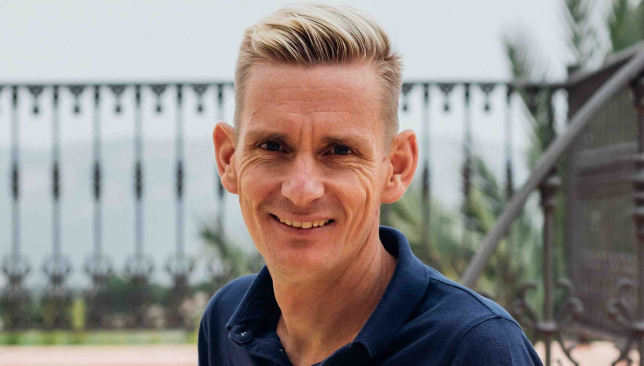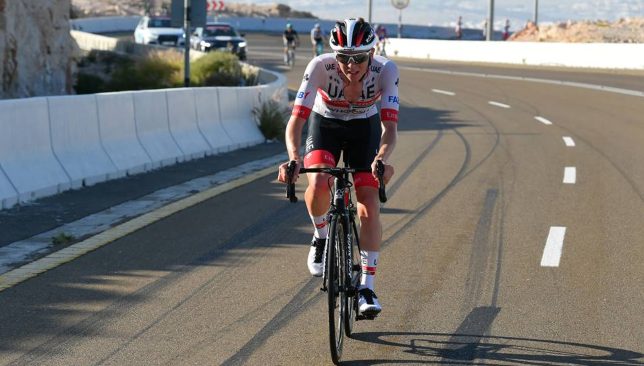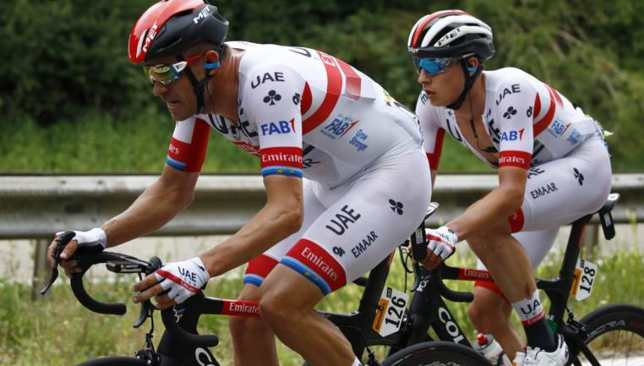
Professional cyclists around the world have scaled back their training programmes in light of the Coronavirus pandemic, unaware as to when they will next be able to test their mettle in a race situation.
Most countries worldwide are on strict lockdown measures and can only leave for brief individual exercise once it’s within two kilometres of their homes.
As a result, riders have been forced to swap the spacious roads and gym floors for the narrow surroundings of their own homes in a bid to maintain fitness levels.
Some cyclists are adjusting to training indoors for the first time, a tough struggle initially, while others like Tadej Pogacar has been tackling the roads as normal with lockdown measures yet to be imposed in his native Slovenia.
The restrictions implemented around the world are tricky, to say the least, and most riders would prefer to be trekking the hills in preparation for the next race.
A man who is seeing it all first hand, UAE Team Emirates Head of Coaching and Assistant Sports Director John Wakefield admits that, although it is a difficult time for everyone, the main thing is his team are in good physical and mental health.
“Everyone is good, they have just accepted it and know it’s their job and they’ve still got to ride their bikes,” he told Sport360 from his base in Girona on Monday.
“As a coaching group, we’ve backed off a bit in terms of the intensity, and have gone back into a pre pre-season training block to keep the intensity low, make some corrections and not necessarily have them hit a peak while they are stuck inside. You don’t want them to burn out mentally by the time the season does resume.
“One or two lads from Monaco have gone back to their respective home countries. Tadej (Pogacar) is an example because the lockdown ban isn’t in Slovenia yet. They are allowed outside but there are some restrictions. Other guys have been stuck inside for quite a while.
“It’s more a mental thing for the majority of them so we are monitoring where they are in terms of motivation and whether they are having more good or bad days and just trying to adjust on that.”

Mentally, you have good and bad days. That’s just the nature of life. Now though, it is more common to feel down, especially when being out of sync from your normal daily routine.
To boost morale, training will always help you to feel better and happier. But for a pro rider who normally clocks up hundreds of kilometres outside each week, having to train indoors just isn’t the same.
Equally though, there is no need to be attempting to train the house down, especially if the season does not resume until late August. As Wakefield says, now is the right time to change the phase of training, placing more emphasis on strength and endurance.
“It’s not really about kilometres now because if you are stuck inside, you can multiply sessions from a time and intensity base. That all adds up at the end of the week, purely cause in layman terms, you never stop moving,” said the South African.
“The riders are doing sessions that mimic endurance rides. We prescribe some fasted rides that trigger your a specific key molecular switch in our muscles, which causes adaptation to endurance training, such as increased mitochondrial (energy manufacturers) and blood vessels, is called PGC-1a. – so maybe two-and-a-half, three hours like that. It couples to be a three or four-hour ride in terms of physiological impact.”
Those hours on the bike are a way of life for cyclists. The bike is their Mecca. Even with no races to look forward to, they will continue to produce 100 per cent effort in whatever training sessions feature in their respective programmes.
With TrainingPeaks, Wakefield and his staff can monitor their riders on a daily basis. No team will be expecting miracles during these uncertain times, just a strong and honest effort to whatever programmes have been prescribed.
And with some guys adjusting to training indoors for the first time, basics are put into place to ease them into a regular training routine. Everyone is different, therefore each rider will adapt differently to training on the bike indoors.
“Our team’s data on each rider’s account is uploaded to the TrainingPeaks platform. With that, we have access to everyone’s account to see who is doing that, are they following it, and if they are not and should there be any problems we are able to help the rider to get to the bottom of it so they are able to carry on with no problems,” he said.
“Sometimes a rider could be battling a bit to focus indoors. With that, we put some basics into place to ease into that. Some riders have never ridden indoors before, only outdoors. For him now, to go 24/7 indoors is pretty rough on him.
“Overall, we’re lucky as a team to say that everyone is doing what they are meant to be doing. They definitely are not having a ‘won this stage day’, but if you take six training days in the week, the guys are very good in four and a half or five of them. You may be good for two weeks, and then a guy might have a bad few days.
“You just have to adjust, pick it up, and go from there. It is definitely an honest effort in terms of how the guys are going.”

Apart from working on the performance side of things, Wakefield also acts as one of the team’s Assistant Sporting Directors. For the races where he is not present, his job is everything in the lead up to race day itself.
Typically, this involves logging on to TrainingPeaks to ensure each rider is uploading their training sessions correctly after doing their prescribed training and then analyse the days work. If a session is not logged or there is a missed session or incomplete, he’ll contact a rider to ask them why and solve the problems if any make sure the prescription going forward is correct.
When things are running smoothly, Wakefield monitors each rider’s training file and provides each with sufficient feedback. If things need to be altered on the training programme, then they will adjust it from there.
However, when the Cape Town native is at a race, his job is split into a few different parts.
“From a performance side, there is not a lot you can do on race day. Your job is essentially to get the rider to race day. If he is feeling bad on the day, there is nothing you can adjust. It would then be more common to say everyone has bad days, so to turn that bad day into a good day from a mental aspect, more than a physical one,” he says. They cannot take a day off during a Tour for example if they on a bad day so its about management and making sure they are best looked after over that day.
“However, if it’s a time trial day, myself and another if he is at the race coach will set up the TT equipment. On the board, I will put down the start times and what time they will start their warm-up protocol. From that, we will set out pacing strategies in terms of certain segments and sectors on the course, whether that’s hills, flats, crosswinds and what they should be doing as a guideline for power to get them a certain end result, whether that is 45 minutes.
“Typically early in the morning, we will do a recon with the rider. I’ll drive it on my own before and then go after with the rider. I’ll always give my feedback, then the rider will give their feedback and we’ll come to a positive conclusion. We put two heads together to come to a conclusion.”